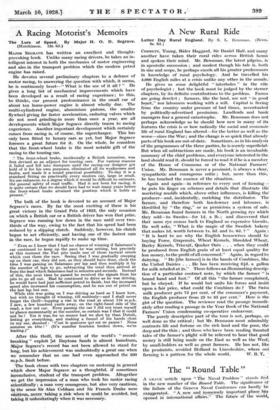A New Rural Ride
Latter Day Rural England. By S. L. Bensusan. (Bonn.
8s. 6(1.) .
CoBBErr, Young, Rider Haggard, Sir Daniel Hall, and many another have taken their rural rides across British farmi; and spoken their mind. Mr. Bensusan, the latest pilgrim, is: in apostolic succession ; and modest though his tale is, both in size and scope, he perhaps excels all his greater predecessors in knowledge of rural psychology. And he travelled his 4,000 English miles at a crisis unlike any other in the annals.
He gives us some delightful " interludes " in the role of psychologist ; but the book must be judged by the sterner chapters, by its definite contributions to the problem. Farms are going derelict ; farmers, like the land, are not " in good heart," nor labourers working with a will. Capital is fleeing from the country under pressure of bad times, accentuated by politically-advertised pessimism. Landlords and bank managers fear a general catastrophe. Mr. Bensusan does not perhaps acknowledge as he should how new in many of its features the crisis is or how radically the social and economic life of rural England has altered—for the better as well as the worse—since the War ; and the change is so quick that already parts of his book are out-of-date. Sometimes, as in his analysis, of the programmes of the three parties, he is merely superficial. But when all subtractions are made, his book is an invaluable. summary of the chief problems, and everyone interested in the. land should read it, should be forced to read it if he is a member of the House of Commons or of the National Farmers' Union. Mr. Bensusan is never a pessimist, is always a clear,' sympathetic and courageous critic ; but, more than this, he has touched the essence of the situation.
Again and again—in referende to every sort of farming—, he puts his finger on schemes and details that illustrate thV marketing muddle which, above other influences, is killing the producer—and, incidentally, enriching the distributor. The farmer, and therefore both ' landowner and labourer, is throttled .by " the ring," or as pernicious a system of sale. Mr. Bensusan found farmers in the North growing rye which they sold—to Swedes—for Id. a lb.; and discovered that that same rye comes back to England as expensive biscuits, He well asks, " What, is the magic of the Swedish bakery that makes Id. worth between ls. 3d. and Is. 6d. " Again : " It is hard to see why the English housewives should be buying Force, Grapenuts, Wheat Kernels, Shredded Wheat; Barley Kernels, Triscuit, Quaker Oats . . . when they could be produced from English grain of at least equal quality for less money, to the profit of all concerned." Again, in regard to dairying. " He [the farmer] is in the hands of Combines, like the United Dairies . . . He has been receiving gid. a gallon for milk retailed at 2s." . There follows an illuminating descrip- tion of a particular contract note, by which the farmer " is bound hand and foot." Of all this "the-farmer complained, but he obeyed. If he would but unite his forces and insist upon a fair price, what could the Combines do Y The Swiss milk producer gets 75 per cent. of the consumer's payment, the English producer from 25 to 85 per cent." Here is the gist of the question. The reviewer read the passage immedi- ately after reading a passage in the Year Book of the National Farmers' Union condemning co-operative endeavour.
The purely descriptive part of the tour is not, perhaps, so well done as the critical ; but Mr. Bensusan most admirably contrasts life and fortune on the rich land and the poor, the deep and the thin ; and those who have been reading iterated tales of the farmer's plight will be relieved to hear that good money is still being made on the East as well as the West; by small-holders as well as great farmers. He has not, like the pessimists, avoided Holland in Lincolnshire, where our farming is a pattern for the whole world. W. B. T. •


























































 Previous page
Previous page